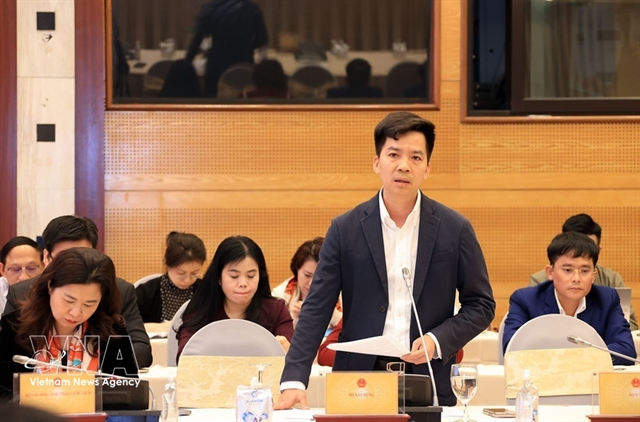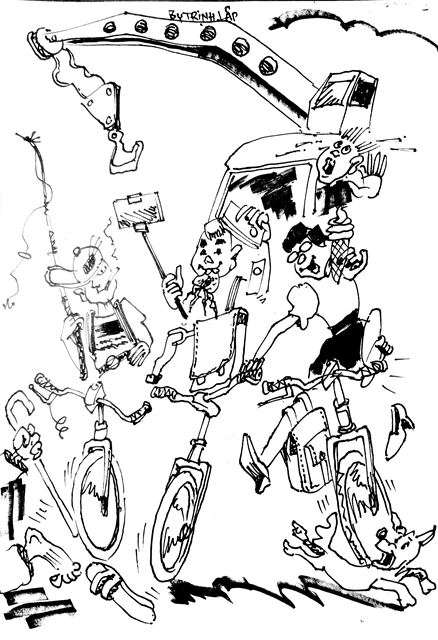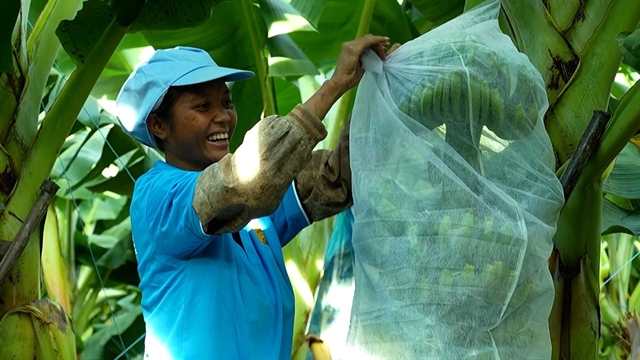 Talk Around Town
Talk Around Town

 |
| Illustration by Trịnh Lập |
by Nguyễn Mỹ Hà
"My teenage girl has been driving me and my hubby crazy. We can't stand it any longer," a colleague and friend recently hit me up, hoping for a chat. I knew how she felt.
There is a lot of literature regarding how puberty changes your child and how parents need to learn to adapt to changes during these years. No matter how much you read, or how much you prepare, when it does strike, it leaves you perplexed and dumbfounded.
Every child is different, and you cannot just copy your friend's successful method, or give a struggling parent advice because it worked with your child. Only one strategy works at a time: listen to your child. Try to put yourself in their shoes, and take it from there.
"She had changed her tone, speaking to us as if we were her servants," my colleague continued. "When we travel, we often share a big room. Her dad once snored while sleeping, and she jumped up in the middle of the night yelling at the top of her voice, 'Shut up!'"
That her beloved daughter should suddenly act up in this way, is a difficulty, no doubt.
It's a challenging period for parents trying to accompany their child to grow and develop and it varies from child to child, but they all need attention, support and understanding.
The authority of parents goes through something of a test: assertive parents, now need to sometimes withdraw, and let the child run and be in charge.
I never understood why my child would ask, "Mum, when can I be in charge? When you're not at home, can I be in charge?"
There's an issue of privacy too, and letting them be responsible for a brief period of time, even in the safe environment of the home.
I used to laugh it off when she used to threaten that she and her best friend would run away from home and find a place to live together, away from the reach of their parents.
But it was a good thing they voiced their concerns, wishes and desires, and we got to be trusted enough to hear them out. They needed to be taken more seriously.
Today, we know more about adolescent growing pains due to the free flow of information. It seems every week, there's a school bullying incident, where junior or high school children beat up their classmates. Parents of bullied kids don't even know until they are invited to school to pick up their kids.
It can be difficult to get the message across to a kid that beating another person, either by hand or with a weapon, is against the law. Being physically abusive to classmates reflects a child's relationship with violence. How should we discipline a student, if he or she is already part of a gang that beats their classmates?
Discipline is usually clearly mapped out, usually starting with a warning, but it can sometimes be even up to a two-week suspension from school. If such discipline is not handled correctly, there can be a backlash.
As a parent, I strongly oppose suspending students from school. Schools are made to train children, not expel them when they make a mistake. Then need to live their life as normally as possible, to get busy with school work and assignments, homework and physical activities. If schools drop their kids, then who will pick them up if they stray further? If it gets worse, it is even harder to get them back.
In Hà Nội, there's a school established in 1989 by the then chairman of the city's Educational Psychology Association, Dr Nguyễn Tùng Lâm. It took in troublesome students that other schools refused to take. Lâm believed that no child is worthless, and they deserved to be in school and get an education.
In 2015, the school even abolished entry exams and would take anyone who wanted to get in (provided their parents could afford the fees).
At this school, a psychological consultation room was among the first set-up in a high school. Today, many other schools have also set up what they call a "comfort" room, where students can go there, feel at ease and share their feelings.
Schools also encourage teachers to take up psychological courses to better understand their students, so they can become better listeners.
Aware there was such a counselling room at my daughter's school, we knew she could always go there. So my kid and her best buddy went with another friend, who didn't feel she had problems. The children were told they were doing fine, but another was asked to send in her parents. It's always good to early detect any symptoms, to get help.
And it's good if parents get help too, if they need it. Not all parents are aware of what's going on with their adolescent children, and if they need to talk to someone professional, they should.
The mental health of adolescents has been receiving growing attention, and the Ministry of Health and UNICEF have launched a communication campaign to support youth in Việt Nam titled, "Open up & Connect".
The campaign will provide tips, resources, and creative ideas to help people learn how to identify if a child or their friend needs help. Quick tips and activities will also provide coping strategies as well as encourage all to open up and connect with others.
I wish when we were struggling with our adolescent child, we had some sort of help like this. The campaign runs until December 11, UNICEF's 77th anniversary, but we hope the impact lasts much longer.
"What should I do every time our child bosses around in that very annoying tone?" my colleague asked.
"Play along," was my suggestion. "If she is acting like an Empress, then obey her, and say, 'yes Your Majesty,' at the end of your every sentence, until she can't help but burst out laughing."
It can be a trying time, but there is one thing that you should always do: tell your kid how adorable they are, how much you love them, and that your love for them is as strong and unbreakable as a diamond that lasts forever.
Always end any dispute with a confirmation sentence expressing your love. If you feel you can't take it any more, well, things may change for the better as their 18th birthday approaches.
In my experience, things change completely around that milestone. I now find my daughter being reasonable in everything she says and does.
Patience always brings a good return: once all the frustration is gone, you and your child will find peace again. VNS




